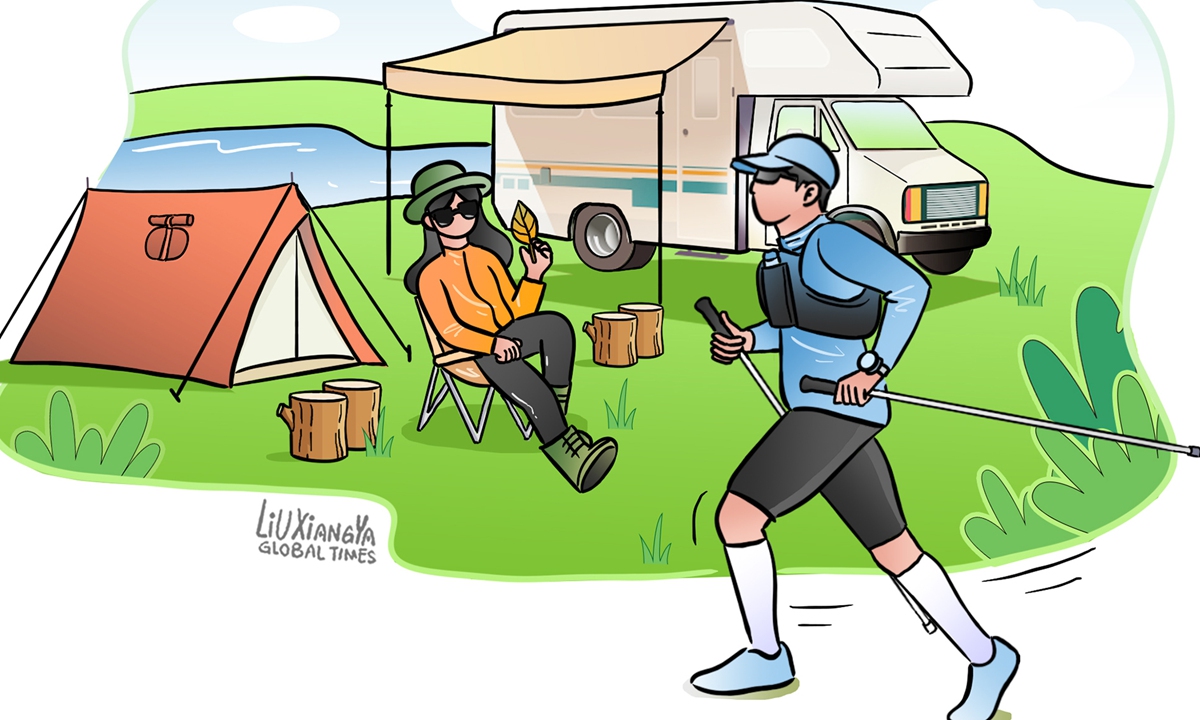
Illustration:Liu Xiangya/GT
The last few years have seen outdoor sports in China grow extremely popular. The 2023 Outdoor Life Trend Report, jointly released by a social networking platform and two other media outlets, shows that outdoor activities have gradually become a part of people's daily lives. From January to October, the number of people who engage in outdoor sports rose by over 100 percent, while the cumulative release of related numbers of posts has reached nearly 7 million. According to the Outdoor Sports Industry Development Plan (2022-2025) issued by the General Administration of Sport of China, the total size of the outdoor sports and leisure activities industry is expected to surpass 3 trillion yuan ($414 billion) by 2025. As the magnetizing power of outdoor sports leads to the industry's prosperity, what are the factors behind this appeal?
From the perspective of sociology, any consumption behavior is closely related to one's social background. Identity and class are accepted and acknowledged through repeated practices in daily consumption. Outdoor sports originated from mountaineering and expeditions for scientific exploration purposes. As a consumption activity, it calls for money and time, which initially belonged to the "leisure class." The rise of outdoor sports in China has been synchronized with the growth of the middle class. Thus, outdoor sports have become an important manifestation of their identity, taste and way of life.
China's protection of natural environment and increasing pursuit of lucid waters and lush mountains no doubt have encouraged people to enjoy nature.
Booming infrastructure construction such as parks and camping sites have allowed access to a more effortless outdoor experience, and industry expansion like entry-level offerings have made it possible for more people to take part. Industrial civilization has promoted modern social development, but it also causes the alienation of people's lives, which results in mental stress, depression, loneliness and emptiness. Nature is often seen as a "mother."
A mother will always accept and listen to us. In our mother's embrace, we can relax physically and psychologically, which provides a vent for negative emotions and allows us to heal. Besides this, factors such as the indifference of interpersonal relationships have led to a stronger desire to return to nature.
Additionally, the distinction between work and leisure characterizes modern life, which bears symbolic significance. Leisure activities signify a way to get rid of monotonous work and free ourselves. Outdoor sports are further endowed with characteristics such as youth, fashion, and vitality, representing the lifestyle of the urbanites.
Moreover, outdoor sports usually unite people as they must jointly cope with unknown dangers and challenges. This helps relieve loneliness, allowing people to gain a sense of belonging and satisfy their inner desire for mutual understanding through cooperation. Apart from the power of unity, it also instills heroism and pride in each member through achievements, stimulating self-awareness, and communication between the individual and the universe.
From the view of philosophy, outdoor sports include a series of binary relations such as civilized versus primitive, individual versus universe, isolation versus interaction, and rational versus emotional, symbolizing a return from the first to the latter.
Modern society requires a balance of various opposite relations. Outdoor sports strike the balance through the imagery of return, like a purification ritual. Outdoor activities represent our body's liberation from modern society. We relax, exercise, or even torture ourselves to train the body so that it becomes the master of itself again through immersion in nature. Thus, we can once again devote ourselves to society.
Online promotion has also played an essential role in developing outdoor sports, sharing experiences, and organizing activities to engage more people. For instance, online lifestyle platforms organized "go wild" festivals, encouraging everyone to go outdoors and conveying positive emotions like healing, romance, and freedom through Key Opinion Leader (KOL) sharing. Such target-oriented notes triggered many sportsmen's desire to go wild and create more related content, resonating with the public and radiating out to a broader group, causing more people to take part in outdoor activities.
The great wilderness provides an alternative and a ceiling-free scene for some activities usually associated with being indoors. As an integration of leisure tourism, sports, culture, and interpersonal communication, outdoor activities empower us and enrich our leisure time.
We escape our tense and routine social life, enjoy nature to refresh ourselves, and return to work with a more energetic body and positive attitude.
The author is a faculty member with the School of Applied Economics, Renmin University of China. life@globaltimes.com.cn




